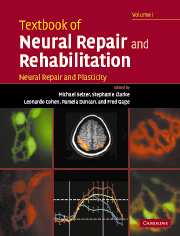Book contents
- Frontmatter
- Contents
- Contents (contents of Volume II)
- Preface
- Contributors (contributors of Volume I)
- Contributors (contributors of Volume II)
- Neural repair and rehabilitation: an introduction
- Section A Neural plasticity
- Section A1 Cellular and molecular mechanisms of neural plasticity
- Section A2 Functional plasticity in CNS system
- 6 Plasticity of mature and developing somatosensory systems
- 7 Activity-dependent plasticity in the intact spinal cord
- 8 Plasticity of cerebral motor functions: implications for repair and rehabilitation
- 9 Plasticity in visual connections: retinal ganglion cell axonal development and regeneration
- 10 Plasticity in auditory functions
- 11 Cross-modal plasticity in sensory systems
- 12 Attentional modulation of cortical plasticity
- Section A3 Plasticity after injury to the CNS
- Section B1 Neural repair
- Section B2 Determinants of regeneration in the injured nervous system
- Section B3 Promotion of regeneration in the injured nervous system
- Section B4 Translational research: application to human neural injury
- Index
8 - Plasticity of cerebral motor functions: implications for repair and rehabilitation
from Section A2 - Functional plasticity in CNS system
Published online by Cambridge University Press: 05 March 2012
- Frontmatter
- Contents
- Contents (contents of Volume II)
- Preface
- Contributors (contributors of Volume I)
- Contributors (contributors of Volume II)
- Neural repair and rehabilitation: an introduction
- Section A Neural plasticity
- Section A1 Cellular and molecular mechanisms of neural plasticity
- Section A2 Functional plasticity in CNS system
- 6 Plasticity of mature and developing somatosensory systems
- 7 Activity-dependent plasticity in the intact spinal cord
- 8 Plasticity of cerebral motor functions: implications for repair and rehabilitation
- 9 Plasticity in visual connections: retinal ganglion cell axonal development and regeneration
- 10 Plasticity in auditory functions
- 11 Cross-modal plasticity in sensory systems
- 12 Attentional modulation of cortical plasticity
- Section A3 Plasticity after injury to the CNS
- Section B1 Neural repair
- Section B2 Determinants of regeneration in the injured nervous system
- Section B3 Promotion of regeneration in the injured nervous system
- Section B4 Translational research: application to human neural injury
- Index
Summary
Introduction
Neurobiologists have only recently been discovering the extent to which injured, adult nervous systems can undergo remarkable functional and structural rearrangement, commonly termed neural plasticity. Neuronal processes, including axons, dendrites, and the synaptic contacts between them are capable of reorganization (see Volume I, Chapter 1) and evidence of neurogenesis has been uncovered in adult primate brains (see Volume I, Chapter 18). Observations of neural plasticity spanning sensory, motor, and association systems at all levels of the neuroaxis have lead to the conclusion that neural plasticity is a general phenomenon of the nervous system including the adult central nervous system (CNS). Forms of plasticity have been suggested as mechanisms for recovery of function, as well as for learning and memory, as described in Chapters 2–5 of this volume. Understanding the form and mechanisms of neural plasticity induced by injury or during learning may lead to the development of better means of neurological rehabilitation through physical, therapeutic and pharmacological manipulations, or neuroprostheses development.
This chapter will focus on the plasticity now known to be possible in the motor regions of the brain. Motor behavior is particularly well suited for studies in plasticity. The overtness of movement lends itself well to documentation of learning, and the sensorimotor cortex has received considerable attention by basic scientists and clinicians alike because of its frequent damage by disease and its relative ease of access for experiment investigation in comparison to deeper lying structures.
Keywords
- Type
- Chapter
- Information
- Textbook of Neural Repair and Rehabilitation , pp. 126 - 146Publisher: Cambridge University PressPrint publication year: 2006



